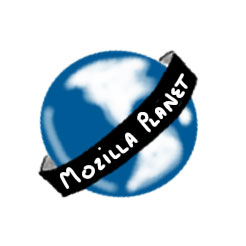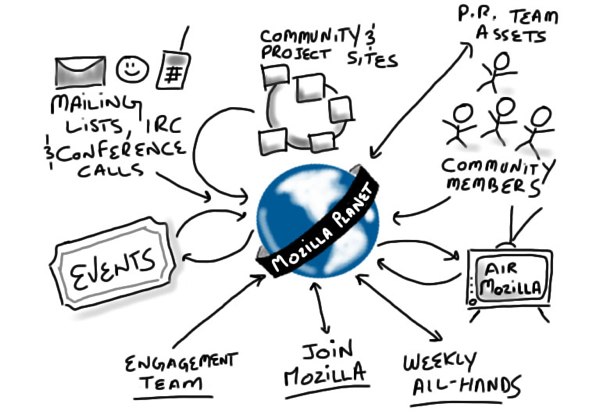Consulting, convening, coding, covering new ground, plus occasional commentary.
commentary
Mozilla Planet: Bootstrapping technology news for the people.

A short vacation concluded, it’s been fun to dive back into the evolving series of blog posts that go all the way from Rethinking Planet Mozilla, to Matt Thompson’s excellent “Planet Mozilla needs humans,” and continue with Lyre Calliope’s posts on “Mozilla as a media organization” (You can catch Lyre talking about the idea on today’s Webmaker community call).
Bootstrapping a technology news site for Mozillians
One of the driving questions we left off with was:
What would be required to bootstrap the best information-delivery system for Mozillians, made by Mozillians, about Mozillians?
And when I say bootstrapping, I mean how do we narrow the idea down to a minimum viable product, i.e., something so simple that it would be possible to get a version of the idea up-and-running in six-to-twelve weeks? What is the very essence of the idea and what are the handful of must-have “features” that would enable the idea to exist in a way that people could interact with it and help to improve it?

In my mind, these are the must-have features of this information-delivery system:
- A narrow and extreme focus on one niche category: innovation within the Mozilla community, specifically the people, the ideas, and the products that are changing the face of the Web.
- A practical demonstration of “Web thinking” and “thinking out loud” applied to the challenge of helping the growing Mozilla community understand the quickly changing world around them.
- A laboratory that experiments with new ideas and open-source tools and libraries to push the envelope of how news, reporting, and information is delivered online.
And here’s a straightforward proposal for how to make it happen:
- A one-year commitment from Mozilla to underwrite the experiment in its start-up phase (and the trust to give the project some editorial independence and a bit of profile).
- One full-time staff writer/blogger with excellent editing skills and a willingness to experiment.
- A small volunteer editorial board who are active writers/editors/bloggers and also keenly plugged into the Mozilla community, e.g., both tech-centric people like Christian Heilmann and Pascal Finette, and also storytellers like Matt Thompson, and Dan Sinker.
In terms of technical practicalities, I would propose the following:
- A blogging platform. Preferably something open source and extensible.
- An inexpensive DSLR that shoots video and a portable audio recorder with a decent microphone, as well as a tripod, smart phone and a laptop.
- Use of a desk at each of the Mozilla Spaces, as required.
Yep. That’s it. Just a blog, some multimedia equipment, and a place for this storyteller to park their arse as they chase the unfolding story of bottom-up innovation in the ever-expanding city that is Mozilla.
(Okay, okay: If the budget allowed, I’d also lobby for a Livestream Livepack, or an open source equivalent, and an annual Livestream Premium subscription, because video is critically important part of news delivery and an important part of the future of the Web too. And, let’s face it, editing video takes time, it’s often better to just “go live” and let the Internet take care of the post-publishing edits.)

This brave and pioneering soul – an expert at uncovering a good story and telling it quickly, concisely, and in the spirit of the Web – would be tasked with producing two “stories”* a day, four days a week, and also editing a handful of other stories submitted by the editorial board and community contributors. They would also manage a news river of their sources, and would communicate regularly and openly with the editorial board and community via micro status updates. Finally, they would collaborate with Mozilla staff and volunteer contributors to iterate forward the technical underpinnings of this initiative. Phew! This is no small endeavor, but I suspect it is one that would appeal greatly to the right person.
* Story defined loosely enough to allow for lots of experimentation with text, multimedia, data, and so on.
Not a new idea, but a proven idea
This project isn’t about breaking new ground. None of this proposal is overly daring or experimental. As Matt pointed out, variations on this idea have been explored by Digg, Tumblr, and even Google.
Beyond these technology-company driven examples, the broader community of online news start-ups illustrate how this enterprise has been undertaken before:
-
TechCrunch: Started as a straightforward blog in 2005 by the tech-obsessed lawyer Michael Arrington, it only took a year to confirm that there was an audience for this hyper-specific beat.
-
LifeHacker: Run single-handedly by founding editor Gina Trapani until September 2005, Lifehacker provides another example of how a “micro-publication” gets bootstrapped.
-
The Tyee: Looking in my own backyard, I’m happy to be able to point to the award-winning Canadian independent online news site TheTyee.ca. Since 2003, this scrappy newsroom has produced high-quality reporting on a tight budget and a tiny staff. Eight years later (and no longer a “start-up,” as founding editor David Beers enjoys pointing out), The Tyee has grown into a prominent and respected Canadian news brand. (Full disclosure, The Tyee is a long-standing client, and I’m big fan of what they’ve accomplished, so I may be gushing a bit here.)
-
The list goes on and on … In fact, there are lots of examples of Web-first micro-publications that bootstrapped themselves quickly and (relatively) inexpensively: Paid Content, 43 Folders, Gizmodo, GigaOm, TreeHugger, Grist, and so on.
Mozilla as a news brand
Phillip however seems to lean toward suggesting something more radical: Planet Mozilla should evolve beyond being a glorified RSS aggregator to a full blown news brand.
Yes, it’s true: as I said before, if the idea is successful the conversation about what to do with Planet Mozilla will be irrelevant. Planet Mozilla would become just one of many sources of information – Mozilla events, news feeds, IRC channels, mailing lists, conference calls, wiki changes, and so on – from which would be distilled a constant drumbeat of pure signal – the unfolding story of innovation in a global community of millions; a focus on the “open Web” and how it’s redefining everything from education to journalism; a technology news site “for the people,” one that doesn’t obsess about the latest proprietary software start-up, the next round of funding, or the imminent purchase by Facebook (Goodbye Instagram!).
There you have it: an elevator pitch of sorts. Mozilla Planet: Technology news for the people. Up-and-running in six-to-twelve weeks. Rapidly innovating with the help of the community it serves. One year to become the best information-delivery system for Mozillians.
What’s your minimum viable product?
About
Hi, I'm Phillip Smith, a veteran digital publishing consultant, online advocacy specialist, and strategic convener. If you enjoyed reading this, find me on Twitter and I'll keep you updated.

Related
Want to launch a local news business? Apply now for the journalism entrepreneurship boot camp
I’m excited to announce that applications are now open again for the journalism entrepreneurship boot camp. And I’m even more excited to ...… Continue reading
Previously
Mexico: Adventures in San Cristobal de las Casas, Chiapas.
From the future
When in doubt, try something new.